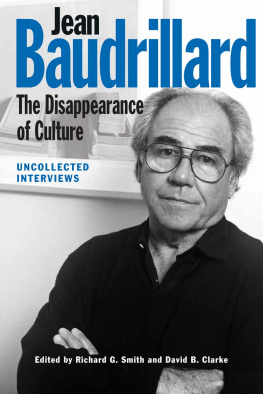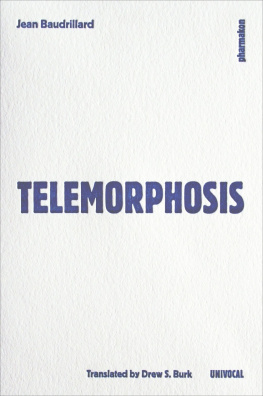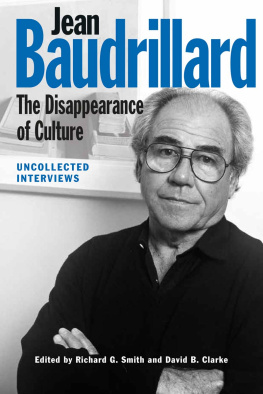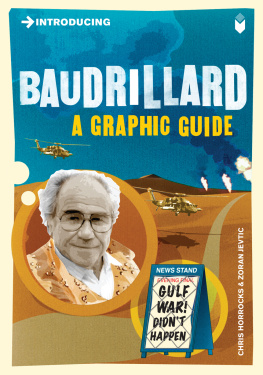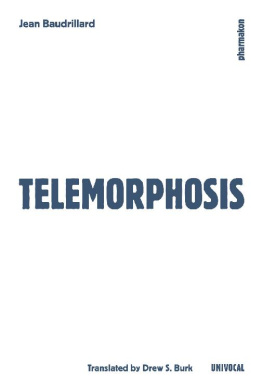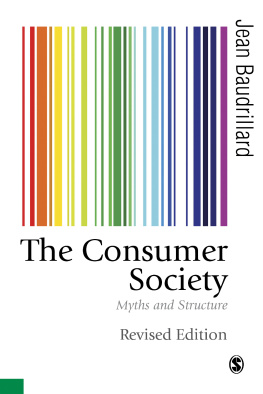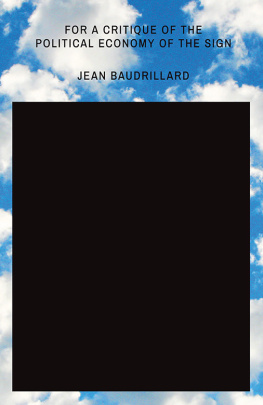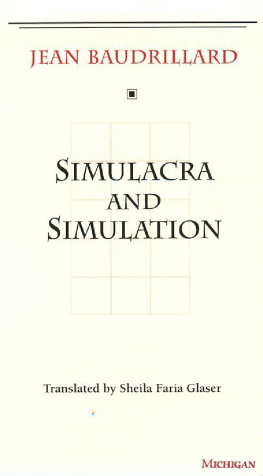Jean Baudrillard: The Disappearance of Culture
Jean Baudrillard: The Disappearance of Culture
Uncollected Interviews
Edited by Richard G. Smith and David B. Clarke

Edinburgh University Press is one of the leading university presses in the UK. We publish academic books and journals in our selected subject areas across the humanities and social sciences, combining cutting-edge scholarship with high editorial and production values to produce academic works of lasting importance. For more information visit our website: edinburghuniversitypress.com
editorial matter and organisation Richard G. Smith and David B. Clarke, 2017
Edinburgh University Press Ltd
The Tun Holyrood Road
12(2f) Jacksons Entry
Edinburgh EH8 8PJ
A CIP record for this book is available from the British Library
ISBN 978 1 4744 1780 8
The right of Richard G. Smith and David B. Clarke to be identified as the editors of this work has been asserted in accordance with the Copyright, Designs and Patents Act 1988, and the Copyright and Related Rights Regulations 2003 (SI No. 2498).
Published with the support of the Edinburgh University Scholarly Publishing Initiatives Fund.
Contents
Acknowledgements
We would like to thank all those who have kindly granted their permission for us to reproduce copyrighted material. Full credit is provided to copyright holders following each interview. Whilst considerable effort has been made to trace and contact copyright holders prior to publication, the editors and publishers apologise for any oversights or omissions and, if notified, will endeavour to remedy these at the earliest opportunity. Our thanks go to the following people for their generous assistance in preparing this book: Marine Baudrillard, Pierre Boncenne, Rex Butler, William Chaloupka, Marcus Doel, Mike Gane, Gary Genosko, Bas Haan, William Merrin, Katharina Niemeyer, Melissa Pawelski, Antoine Perraud, Tim Otto Roth, Diane Rubenstein, Dick van Spronsen, William Stearns, and Antoon Van den Braembussche. Last but certainly not least, we offer our sincere thanks to Chris Turner and to Carol Macdonald for their considerable efforts and ongoing support throughout the preparation of the manuscript.
Introduction: Baudrillard Unplugged
Nothing (not even God) now disappears by coming to an end, by dying. Instead, things disappear... as a result of their transfer into the secondary existence of simulation. Rather than a mortal mode of disappearance, then, a fractal mode of dispersal.
(Baudrillard 1993a: 4)
It is forbidden to unplug yourself, and not only in active, interactive social life, but also on your deathbed: it is forbidden to tear out the tubes, even if you want to... The network principle carries with it the absolute moral obligation to remain plugged in.
(Baudrillard 1990: 197)
Jean Baudrillard (19292007), a French thinker associated with the Events of May 1968 who subsequently staged his own disappearance from the rarefied world of academia in order to reappear as a free radical, an agent provocateur of the cultural sphere, understood the nature of disappearance better than most and, with it, the fate of the world. His position outside the academy allowed him to bear witness to the events, non-events, and processes of disappearance that are documented in the series of interviews employing that term sensu amplo brought together in this volume. What we shall continue to refer to as interviews as a convenient short-hand in fact encompasses a far wider range of dialogical formats: panel discussions, round tables, and question-and-answer sessions, as well as interviews as conventionally understood.
Baudrillards withdrawal from the French academic scene, whilst hardly a deliberate ploy, nonetheless marked his destiny. It allowed him to disengage from the established currents of academic thought, to escape the gravitational pull of notions such as alienation, class struggle, cultural capital, the unconscious, desire, and so on, and to embark on an ex-orbital trajectory that allowed his own singular perspective
In 1977, a double-page spread in the Magazine Littraire () featured Dominique Grisonis attempt to visualise the complex network of influences connecting leading French thinkers to each other and to the wider intellectual milieu of continental philosophy (Grisoni 1977). Resembling an electrical circuit diagram rather more than a family tree, it nonetheless positions three founding fathers Nietzsche, Marx, and Freud at the apex of a web of interconnections that encompasses some thirty key thinkers and spans a range of philosophical traditions. What is striking is that Baudrillard is already visualised as entirely disconnected from the network: out of the game, unplugged, with no arrows connecting him to any other thinker. 1977 was the year of publication of Forget Foucault (Baudrillard 2007), a succs de scandale which saw Baudrillard spectacularly sever his ties with the tightly knit world of French academe and burn his bridges with philosophy. I make no claim to the title of philosopher. The history of ideas doesnt interest me; its had no determining influence on me. I may have written a few conventional analyses... But then it turned into something else (Baudrillard, in Smith and Clarke 2015: 57). The interviews that follow fall under the category of something else. Whilst one might pin any number of the abiding conceptual terms that emerge from Baudrillards oeuvre on the selection we have made for this volume terms that constantly recur, evolve, and mutate; such as reversibility, seduction, or duality we have elected disappearance as the term best suited to establishing some consistency to what follows. The disappearance of culture might be seen as an irreducible element in a collection that traverses themes as disparate and wide-ranging as terrorism, art, politics, photography, evil, value, war, architecture, and so on.
If disappearance implies, on the one hand, an entropic process of dissipation, a viral process of contagion, a metastatic process of proliferation, or the affine redundancy of fractal geometry, there is, on the other hand, an art of disappearance. This is an art in which Baudrillard was well versed knowing how and when to steal away, leaving events to exhaust themselves (whilst finding pleasure in the objective irony of non-events). Underlying this modus operandi is a fundamental recognition. Despite concerted efforts, over several centuries, to strip away the illusory appearances of the world and reveal the rational kernel of the real, the worlds furtive destiny remains remarkably unscathed. Attempts to force the unconditional realisation of the world, to impose a final solution on the enigma of the world, have redounded in the world poised to take its revenge. A fatal reversibility has taken hold, as the forced realisation of the world engenders an excess of reality, ushering in a state of hyperreality that short-circuits the distinction between the real and its double: even The image cannot imagine the real any longer, because it has become the real... it has become its own virtual reality (Baudrillard 1997: 12).

Figure 1 Dominique Grisonis Inter-fluences de la philosophie contemporaine [Inter-fluences in contemporary philosophy] (Grisoni 1977).

